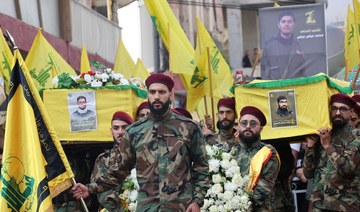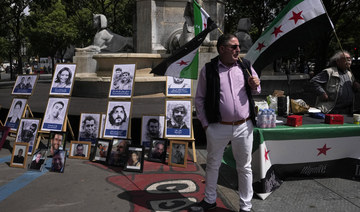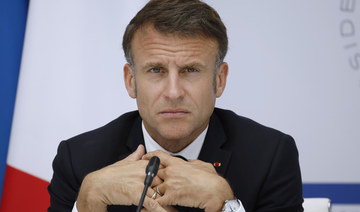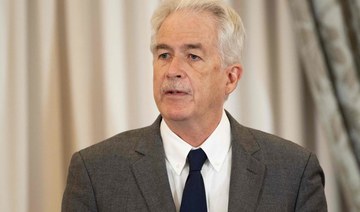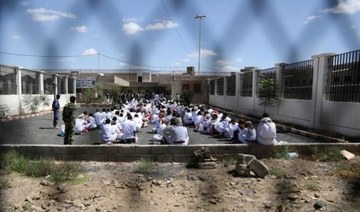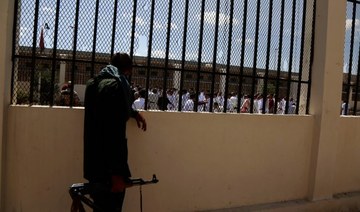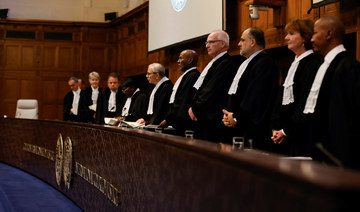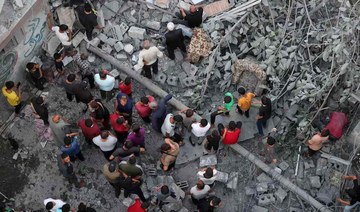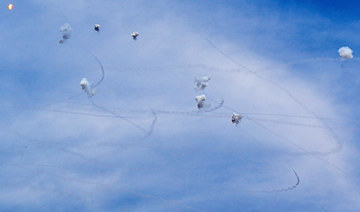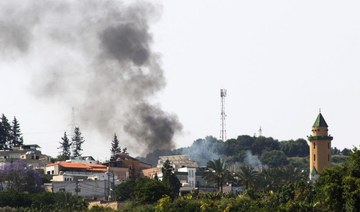MOSUL: Iraqi forces are steadily closing in on the remaining pockets of territory held by the Daesh group in Mosul, inching toward a victory that US-led coalition officials say is “only a matter of time.”
But unlike past urban battles against Daesh in Iraq, the militants in Mosul are under siege by Iraqi forces.
The Iraqi government on Friday announced a call for all civilians in the Old City to flee, but human rights groups warned the orders could force tens of thousands into deadly frontline clashes.
The decision to surround the remaining Daesh holdouts is prolonging an already grueling fight, according to Iraqi commanders, and is punishing civilians being held by Daesh as human shields.
In the fight for Fallujah and Ramadi, cities that were also overrun by Daesh in 2014 as the group seized vast swaths of territory in Iraq, there was a tipping point in the battles — the moment when the militants’ hold on a city had shrunk to only a handful of neighborhoods. At that point, senior Daesh fighters began to flee in greater numbers, the extremists’ command and control dissolved, defenses crumbled and Iraqi ground forces racked up a series of swift gains.
But in Mosul, Iraq’s second-largest city after Baghdad, Iraqi forces backed by the US-led coalition have shrunk Daesh-held territory to less than 5 percent of the city and still resistance has remained stiff.
In what was meant to be a simple clearing operation last week, Iraqi Maj. Ihab Jalil Al-Aboudi and his unit were pinned down for hours at a residential intersection in western Mosul just a few hundred meters from the Old City.
By afternoon, at least three coalition airstrikes were called in to clear Daesh fighters armed with medium machine guns and rocket-propelled grenade launchers.
“Because the enemy cannot flee, the area is completely sealed off,” said Brig. Gen. Haider Fadhil of Iraqi special forces. He said it’s impossible to predict how the next few weeks of the Mosul operation will play out, but so far the siege of the Old City is slowing progress on the ground.
“We are noticing that the closer we get to the Old City, the greater the resistance,” he added, looking over the roughly 8 square kilometers (3 square miles) of Mosul territory still in Daesh hands on a satellite mapping app.
The Old City — a warren of tightly packed homes and roads that shrink to the width of footpaths — holds special significance for Mosul’s residents and Daesh. The district is home to much of Mosul’s ancient heritage, including the Iconic leaning minaret of the Al-Nuri Mosque where Daesh leader Abu Bakr Al-Baghdadi declared an Islamic caliphate stretching across Daesh-held lands in Syria and Iraq in June 2014.
US defense officials say “taking the time” to surround Daesh strongholds is part of a new approach in the war against Daesh under the Trump administration, aimed at preventing militants from regrouping after territorial losses and foreign fighters from fleeing.
“The foreign fighters are the strategic threat, should they return home,” Defense Secretary Jim Mattis said at a Pentagon briefing on May 19. “So by taking the time to de-conflict, to surround and then attack, we carry out the annihilation campaign so we don’t simply transplant this problem from one location to another.”
Iraq’s fight to retake Mosul began last October. By November, Iraqi forces had punched into the city limits along Mosul’s eastern edge. In January, after 100 days of fighting, eastern Mosul was declared “fully liberated.”
All the bridges spanning the Tigris River, which roughly divides Mosul into its eastern and western half, has been destroyed by coalition airstrikes, but residents reported Daesh fighters still managed to flee west, ahead of the Iraqi advances.
In February, Iraqi forces closely backed by the US-led coalition launched the operation for western Mosul, initially planning to clear it of Daesh fighters south-to-north. But after the federal police stalled on the southern edge of the Old City just weeks into the push, the joint command center adjusted the plans, ordering Iraqi forces to first sweep up and around the congested Old City.
The slow military approach may be helping Iraqi and coalition forces kill and capture more Daesh fighters but it has put trapped civilians at greater risk, according to residents who recently fled neighborhoods still in Daesh hands.
A woman from Al-Rifai neighborhood, who fled with her daughter after their house collapsed in an explosion, said her two sisters and their families were still inside the Old City.
It had been weeks since she heard from them, she said, speaking to The Associated Press from a civilian screening center south of Mosul on condition of anonymity, fearing for her relatives’ safety.
Smugglers who deliver food into the district told her that months of Iraqi artillery and airstrikes have killed hundreds, she said. “In a single day they buried 30 bodies,” she said.
Iraq’s military dropped leaflets over the Old City Friday asking civilians to flee “immediately” to “safe passages” where they will be greeted by “guides, protectors and (transportation) to reach safe places,” according to a government statement.
But human rights group Save the Children warned the order would likely lead to “deadly chaos” as the Iraqi government has not negotiated safe passage for civilians with Daesh.
Over the past two weeks Daesh has begun barricading families inside their homes, said Khaled Ahmed Aziz, also from Al-Rifai. He said Daesh recently welded the doors to his sister’s home shut.
“Now, even if she wanted to flee, she cannot,” he said.
Ayad Sayyid, a doctor working at a clinic treating civilians fleeing Mosul said as the battle has ground on he is seeing more children and elderly patients suffering from malnutrition.
Last month there were about five cases a week, now he says he sees 20. Mosul residents have been suffering from food shortages for months, a hardship expected to be exacerbated during the holy month of Ramadan that began Friday night, when Muslims fast during daylight hours.
“It’s a disaster,” he said, adding that even before the battle, the residents of the Old City were among Mosul’s poorest.
Since the push on western Mosul began, the United Nations says more than 580,000 people have been forced to flee.
“Please save the Old City as soon as possible,” the woman from Al-Rifai pleaded. “But, please stop the airstrikes, there are already enough bodies under the rubble.”
Mosul siege extends Daesh fight in Iraq, puts civilians at risk
Mosul siege extends Daesh fight in Iraq, puts civilians at risk
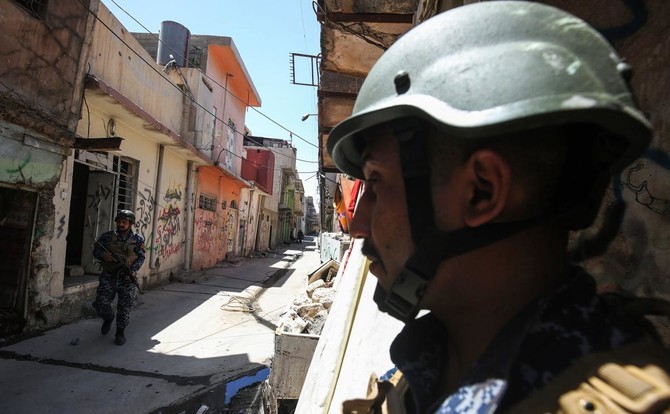
More than one in four Syrians ‘extremely poor’: World Bank
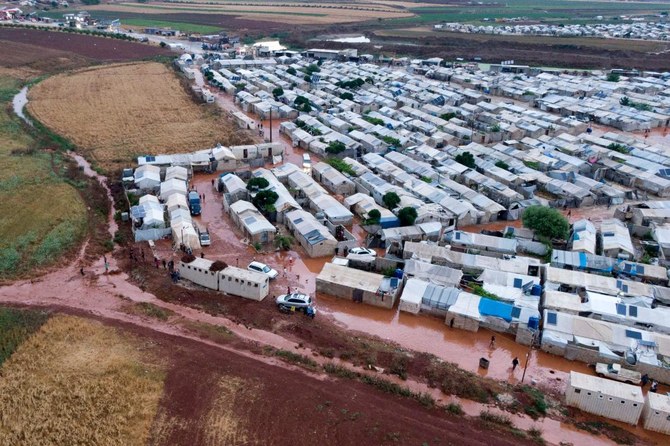
- 27 percent of Syrians — about 5.7 million individuals — live in extreme poverty
- “Continued funding shortfalls and limited access to humanitarian assistance” have further strained poor Syrians, the World Bank said
BEIRUT: More than a quarter of Syrians live in extreme poverty, the World Bank said Saturday, 13 years into a devastating civil war that has battered the economy and impoverished millions.
The World Bank published two new reports on Syria, which found that “27 percent of Syrians — about 5.7 million individuals — live in extreme poverty.”
“Extreme poverty, while virtually non-existent before the conflict, affected more than one in four Syrians in 2022” and might have further deteriorated after a deadly earthquake last year, one of the reports said.
The quake killed about 6,000 people in the country.
According to the United Nations, about 90 percent of Syrians live in poverty, while it previously estimated that around 2 million lived in extreme poverty after more than a decade of war.
The report cited neighbor Lebanon’s economic meltdown in late 2019, the Covid-19 pandemic and the war in Ukraine, as having eroded the welfare of Syrian households in recent years.
The civil war in Syria has also ravaged the economy, infrastructure and industry, while Western sanctions have added to the country’s woes.
“Continued funding shortfalls and limited access to humanitarian assistance” have further strained poor Syrians, already coping with “soaring prices, reduced access to essential services and rising unemployment,” the World Bank said.
The UN told AFP previously that its humanitarian response plan for Syria for 2024 requires more than $4 billion but that it is only six percent funded.
The international community is set to meet in Brussels Monday to try and muster funds for Syria at a yearly pledging conference.
A lack of opportunities and dwindling aid has pushed many Syrians to rely on money sent from relatives abroad to survive, with the World Bank estimating that “in 2022, the total value of remittances received by Syrian households reached about $1.05 billion.”
Syria’s estimated GDP stood at around $6.2 billion in 2023.
Syria’s “real GDP is projected to contract by 1.5 percent in 2024, extending the 1.2 percent decline in 2023,” the report said.
“Inflation is anticipated to remain high in 2024 due to the pass-through effects of currency depreciation, along with persistent shortages and potential further subsidy cuts (for) food and fuel,” it said.
Syria’s war has killed more than half a million people and displaced millions more since it erupted in 2011 after Damascus cracked down on anti-government protests.
Israel official says ‘intention’ to renew Gaza talks ‘this week’
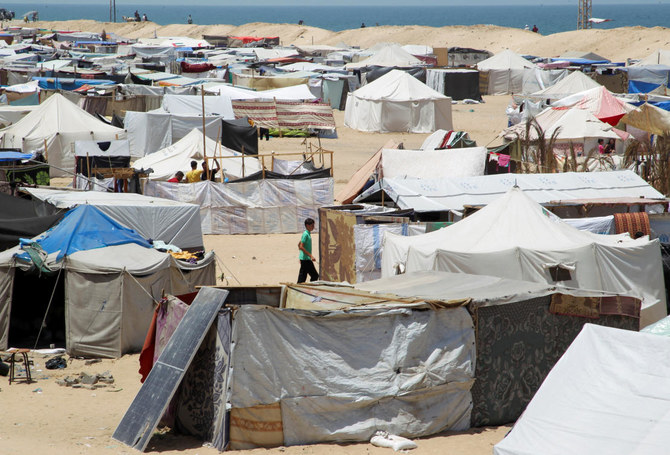
- “There is an intention to renew the talks this week and there is an agreement,” said the official
- The official did not elaborate on the agreement
JERUSALEM: An Israeli official said Saturday the government had an “intention” to renew “this week” talks aimed at reaching a hostage release deal in Gaza, after a meeting in Paris between US and Israeli officials.
“There is an intention to renew the talks this week and there is an agreement,” the official told AFP on condition of anonymity.
The Israeli official did not elaborate on the agreement, but Israeli media reported that Mossad chief David Barnea had agreed during meetings in Paris with mediators CIA Director Bill Burns and Qatari Prime Minister Mohammed bin Abdulrahman Al-Thani on a new framework for the stalled negotiations.
Top US diplomat Antony Blinken also spoke with Israeli war cabinet minister Benny Gantz about new efforts to achieve a ceasefire and reopen the Rafah border crossing, Washington said.
Talks aimed at reaching a hostage release and truce deal in the Gaza Strip ground to a halt this month after Israel launched a military operation in the territory’s far-southern city of Rafah.
The Gaza war broke out after Hamas’s October 7 attack resulted in the deaths of more than 1,170 people, mostly civilians, according to an AFP tally based on Israeli official figures.
Militants also took 252 hostages, 121 of whom remain in Gaza, including 37 the army says are dead.
Israel’s retaliatory offensive has killed at least 35,903 people in Gaza, mostly women and children, according to data from the Hamas-run territory’s health ministry.
Yemen’s Houthis postpone release of 100 prisoners belonging to government forces
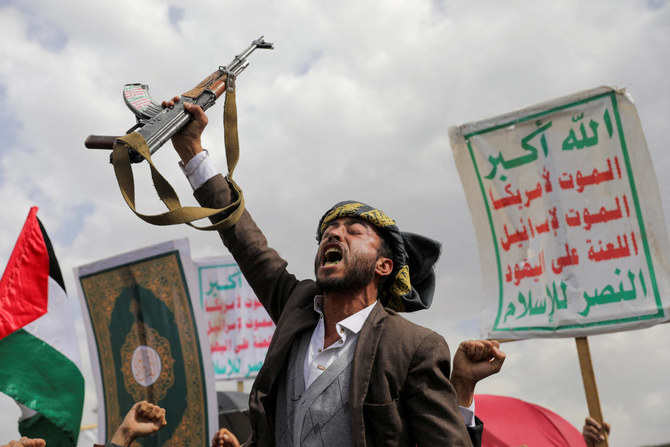
- The Houthis, an Iran-aligned movement that controls part of the country, last released prisoners in April 2023
- Yemen has been embroiled in years of civil war that has killed tens of thousands of people and left millions hungry
CAIRO: Yemen’s Houthis said they had postponed the release of around 100 prisoners belonging to government forces that had previously been announced to take place on Saturday.
A Houthi official said that the delay was because of “technical reasons,” adding the release would take place at another time.
The head of the Houthi Prisoner Affairs Committee, Abdul Qader Al-Murtada, said on Friday that the group would release more than 100 prisoners in what he called “a unilateral humanitarian initiative.”
The Houthis, an Iran-aligned movement that controls part of the country, last released prisoners in April 2023 in an exchange of 250 Houthis for 70 government forces.
Yemen has been embroiled in years of civil war that has killed tens of thousands of people and left millions hungry.
The Houthis are the de facto authorities in northern Yemen, while the internationally recognized government is represented by the Political Leadership Council, which took over power from Yemen’s president-in-exile.
Spain demands Israel comply with UN court ruling on Rafah, Britain criticizes order
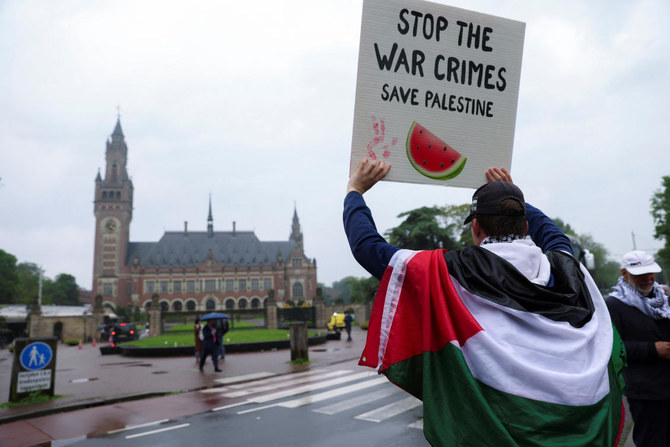
- Spanish government: Ruling by the International Court of Justice is legally binding
- British government says ruling would strengthen Palestinian Islamist group Hamas
MADRID/LONDON: The Spanish government demanded on Saturday that Israel comply with an order by the top UN court to immediately stop its bombardment and ground assault on the Gazan city of Rafah.
It stressed that the ruling on Friday by the International Court of Justice (ICJ) was legally binding.
“The precautionary measures set out by the ICJ, including that Israel should cease its military offensive in Rafah, are compulsory. Israel must comply with them,” Foreign Minister Jose Manuel Albares wrote on X.
“The same goes for a ceasefire, the release of the hostages and access for humanitarian aid (to Gaza),” he said.
“The suffering of the people of Gaza and the violence must end.”
The British government, meanwhile, has criticized the World Court order, saying the ruling would strengthen Palestinian Islamist group Hamas.
“The reason there isn’t a pause in the fighting is because Hamas turned down a very generous hostage deal from Israel. The intervention of these courts — including the ICJ today — will strengthen the view of Hamas that they can hold on to hostages and stay in Gaza,” a UK foreign ministry spokesperson said late on Friday.
“And if that happens there won’t be either peace, or a two-state solution.”
In a case brought by South Africa alleging the Israeli assault on Gaza amounts to “genocide,” the ICJ ordered Israel on Friday to “immediately halt” the ground and air offensive in Rafah.
The operations began on May 7 despite international fears for the safety of the 1.4 million civilians trapped in the city.
The Hague-based ICJ, whose orders are legally binding but lack direct enforcement mechanisms, also ruled that Israel must keep open the key Rafah crossing with Egypt to allow “unhindered” humanitarian aid into Gaza.
And it urged the “unconditional” release of hostages taken by Hamas fighters during their October 7 attack in Israel.
Israel responded on Saturday by bombing Rafah and other parts of the densely populated Gaza Strip.
Spain is one of the European countries to have been most critical of Israel over the war in Gaza.
On Wednesday, Spain, Ireland and Norway said their governments would recognize a Palestinian state from next week.
Israel summoned their envoys to “reprimand” them for the decision and on Friday said it would ban Spain’s consulate in Jerusalem from helping Palestinians in the occupied West Bank.
The war in Gaza began after Hamas’s unprecedented October 7 attack, which resulted in the deaths of more than 1,170 people, mostly civilians, according to an AFP tally based on Israeli official figures.
Some 252 people were taken hostage, 121 of whom remain in Gaza, including 37 the Israeli army says are dead.
Israel’s retaliatory offensive has killed at least 35,857 people in Gaza, mostly women and children, according to data from the Hamas-run territory’s health ministry.
Israeli strike kills two Hezbollah fighters in Syria: monitor
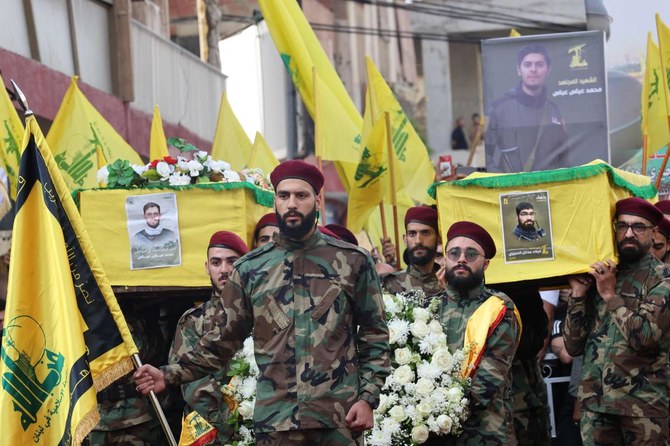
- It was the third strike against Hezbollah targets in Syria in about a week
BEIRUT: An Israeli drone strike in central Syria killed two fighters from Lebanon’s Iran-backed Hezbollah movement on Saturday, a war monitor said.
“An Israeli drone fired two missiles at a Hezbollah car and truck near the town of Qusayr in Homs province, as they were on their way to Al-Dabaa military airport, killing at least two Hezbollah fighters and wounding others,” said the Syrian Observatory for Human Rights.
It was the third strike against Hezbollah targets in Syria in about a week.
On Monday, Israeli strikes in the Qusayr area, which is close to the Lebanese border, killed eight pro-Iranian fighters, said Observatory, a Britain-based monitor with a network of sources in Syria.
At least one Hezbollah fighter was among those killed, a source from Hezbollah told AFP at the time.
Another strike, on May 18, targeted “a Hezbollah commander and his companion,” the Observatory said. It did not report any casualties.
Israel rarely comments on individual strikes in Syria but has repeatedly said it will not allow its arch-enemy Iran to expand its presence there.
Israel has carried out hundreds of strikes in Syria since the outbreak of the civil war in its northern neighbor, mainly targeting army positions and Iran-backed fighters including from Hezbollah.
The strikes have increased since Israel’s war with Hamas in the Gaza Strip began on October 7, when the Iran-backed Palestinian militant group launched an unprecedented attack against Israel.
Syria’s war has killed more than half a million people and displaced millions more since it erupted in 2011 after Damascus cracked down on anti-government protests.


